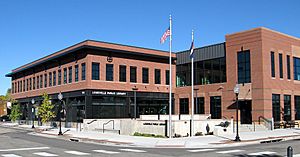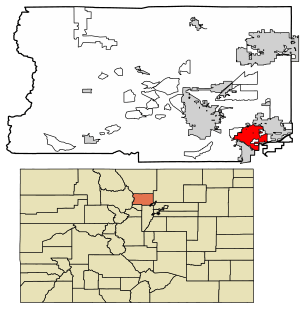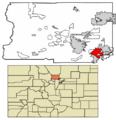Louisville, Colorado facts for kids
Quick facts for kids
Louisville, Colorado
|
||
|---|---|---|
| City of Louisville | ||

The Louisville Public Library, built in 2006
(American Institute of Architects Award, 2007) |
||
|
||

Location of the City of Louisville in Boulder County, Colorado.
|
||
| Country | ||
| State | ||
| County | Boulder County | |
| City | Louisville | |
| Settled | 1877 | |
| Incorporated | June 3, 1882 | |
| Government | ||
| • Type | Home rule municipality | |
| Area | ||
| • Total | 20.89 km2 (8.06 sq mi) | |
| • Land | 20.60 km2 (7.95 sq mi) | |
| • Water | 0.29 km2 (0.11 sq mi) | |
| Elevation | 1,646 m (5,401 ft) | |
| Population
(2020)
|
||
| • Total | 21,226 | |
| • Density | 1,016.08/km2 (2,633.5/sq mi) | |
| Time zone | UTC−7 (MST) | |
| • Summer (DST) | UTC−6 (MDT) | |
| ZIP codes |
80027-80028
|
|
| Area code(s) | 303, 720 | |
| FIPS code | 08-46355 | |
| GNIS feature ID | 2410884 | |
| Highways | US 36, SH 42, Northwest Parkway NW Parkway | |
The City of Louisville (pronounced LOO-iss-vill) is a city in southeastern Boulder County, Colorado, United States. It is a "home rule municipality," which means it has the power to create its own local laws. In 2020, about 21,226 people lived there. Louisville started as a place where people mined coal in 1877. Over time, it changed from a mining town to a friendly suburban community.
Contents
History
How Louisville Began
The town of Louisville started in 1877 when the Welch Mine opened. This was the first coal mine in an area known as the Northern Coalfield. The town was named after Louis Nawatny, who owned the land and planned out the town. Louisville officially became a town in 1882.
Mining Days
The Northern Coalfield was very rich in coal. About 30 different mines operated in Louisville over the years. At its busiest, around 1907–1909, 12 mines were working at the same time. One mine, the Acme Mine, dug up two million tons of coal from right under the center of town! Because there were many different mining companies, Louisville was not controlled by just one big company.
The coal from this area was a lower quality, so it couldn't be moved far away. Miners usually worked in the winter when people needed coal for heating. In the summers, they played baseball at a field called "Miners Field."
Challenges and Changes
There are stories about secret tunnels connecting old saloons in the city, but these are just myths. During tough times, like worker conflicts, many people hid in their basements to stay safe from stray bullets.
From 1910 to 1914, coal miners in Northern Colorado went on strike. They wanted better working conditions, higher pay, and fewer working hours. When miners at the Hecla Mine stopped working, the company hired guards. These guards sometimes shot into the town. Louisville was even part of a bigger conflict called the Colorado Coalfield War in 1914.
Eventually, it became too expensive to mine the remaining coal. The last coal mines in Louisville closed in the 1950s. In 2001, Louisville changed its government to become a home rule city. This gave the city more power to make its own decisions, like how to handle power lines.
The Marshall Fire
In late December 2021, a very large wildfire called the Marshall Fire spread quickly near Louisville. This fire was the most damaging in Colorado's history. It affected Louisville, the nearby city of Superior, and other areas in Boulder County.
In Louisville, 553 homes were completely destroyed, and 45 more were damaged. Over 21,000 people in Louisville had to leave their homes quickly because of strong winds (over 100 miles per hour) that spread the fire. Sadly, one person died, and another is missing. Investigators are still working to find out exactly what caused the fire.
Geography
Louisville is located in the southeastern part of Boulder County. U.S. Highway 36, also known as the Denver-Boulder Turnpike, runs along the city's southwest edge.
The city covers about 20.7 square kilometers (about 8 square miles). Most of this area is land, with a small amount of water.
Demographics
| Historical population | |||
|---|---|---|---|
| Census | Pop. | %± | |
| 1880 | 450 | — | |
| 1890 | 596 | 32.4% | |
| 1900 | 966 | 62.1% | |
| 1910 | 1,706 | 76.6% | |
| 1920 | 1,799 | 5.5% | |
| 1930 | 1,681 | −6.6% | |
| 1940 | 2,023 | 20.3% | |
| 1950 | 1,978 | −2.2% | |
| 1960 | 2,073 | 4.8% | |
| 1970 | 2,409 | 16.2% | |
| 1980 | 5,593 | 132.2% | |
| 1990 | 12,361 | 121.0% | |
| 2000 | 18,937 | 53.2% | |
| 2010 | 18,376 | −3.0% | |
| 2020 | 21,226 | 15.5% | |
| U.S. Decennial Census | |||
Demographics refers to information about the people living in a place, like how many there are. The population of Louisville has grown a lot over the years, especially since the 1980s. In 2020, the city had 21,226 residents.
Economy
Louisville is home to several interesting companies. Rogue Wave Software, which creates software for computer programs, has an office here. Sierra Space, a company that builds parts for spacecraft, also has a location in Louisville. You can also find an office for the ride-sharing company Uber in the city.
Arts and Culture
Louisville has a lively downtown area with many fun things to do. The Steinbaugh Pavilion is a popular spot. In the summer, it hosts the Louisville Street Faire with local bands and street vendors. In winter, it becomes an ice rink!
You can also visit the farmers' market on Saturdays from May to October. It's a great place to find fresh food and local goods. Louisville also has about 32 miles of trails for walking, running, and biking.
Education
Louisville has several schools for students. There are six public schools and six private schools. The public middle and high schools include Louisville Middle School, Monarch K-8, and Monarch High School. The city also has a public library.
For those interested in college, nearby higher education options include the University of Colorado at Boulder, Naropa University, and Front Range Community College.
Images for kids
See also
 In Spanish: Louisville (Colorado) para niños
In Spanish: Louisville (Colorado) para niños
 | William L. Dawson |
 | W. E. B. Du Bois |
 | Harry Belafonte |






